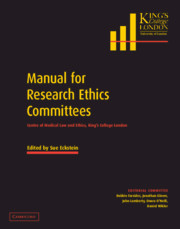Book contents
- Frontmatter
- Contents
- Editorial board
- Acknowledgements
- List of contributors
- Introduction
- Part I
- 1 The ethics of clinical research
- 2 Research ethics committees and the law
- 3 The regulation of medical research: a historical overview
- 4 The regulation of medical research in the UK
- 5 Observational and epidemiological research
- 6 Social survey research
- 7 Approaching qualitative research
- 8 Complementary and alternative medicine: challenges for research ethics committees
- 9 The ethical review of student research in the context of the governance arrangements for research ethics committees
- 10 The ethics of genetic research
- 11 Research or audit?
- 12 Randomised controlled trials
- 13 Determining the study size
- 14 Risk assessment for research participants
- 15 Absorbed radiation in patient and volunteer studies submitted to the ethical committee: a memorandum
- 16 A guide to the use of radioactive materials and radiological procedures for research purposes
- 17 Indemnity in medical research
- 18 The prevention and management of fraud and misconduct: the role of the LREC
- 19 Understanding clinical trials: a model for providing information to potential participants
- 20 The law relating to consent
- 21 Writing information for potential research participants
- 22 The law relating to confidentiality
- 23 Research involving vulnerable participants: some ethical issues
- 24 The ethics of research related to healthcare in developing countries
- Part II
- Index
3 - The regulation of medical research: a historical overview
Published online by Cambridge University Press: 08 January 2010
- Frontmatter
- Contents
- Editorial board
- Acknowledgements
- List of contributors
- Introduction
- Part I
- 1 The ethics of clinical research
- 2 Research ethics committees and the law
- 3 The regulation of medical research: a historical overview
- 4 The regulation of medical research in the UK
- 5 Observational and epidemiological research
- 6 Social survey research
- 7 Approaching qualitative research
- 8 Complementary and alternative medicine: challenges for research ethics committees
- 9 The ethical review of student research in the context of the governance arrangements for research ethics committees
- 10 The ethics of genetic research
- 11 Research or audit?
- 12 Randomised controlled trials
- 13 Determining the study size
- 14 Risk assessment for research participants
- 15 Absorbed radiation in patient and volunteer studies submitted to the ethical committee: a memorandum
- 16 A guide to the use of radioactive materials and radiological procedures for research purposes
- 17 Indemnity in medical research
- 18 The prevention and management of fraud and misconduct: the role of the LREC
- 19 Understanding clinical trials: a model for providing information to potential participants
- 20 The law relating to consent
- 21 Writing information for potential research participants
- 22 The law relating to confidentiality
- 23 Research involving vulnerable participants: some ethical issues
- 24 The ethics of research related to healthcare in developing countries
- Part II
- Index
Summary
Attempts to regulate the conduct of medical research have a surprisingly long history. The first regulations were made just over 100 years ago. Since 1970, however, there has been exponential growth in writing regulations, laws, codes of practice and guidelines. Such activity would suggest that they are an effective way of ensuring high standards of ethical conduct in research involving human participants, but there is little evidence to show this to be true.
Many regulations, including the earliest, have been written in response to various scandals in medical research. Public outcry at the abuse of human rights in medical experiments in the Nazi concentration camps, or in the Tuskegee syphilis study, for instance, led to the writing of the Nuremberg Code and the US National Research Act. Yet a review of the development of research ethics in the twentieth century suggests that such scandals may have made little difference. What seems to be making some difference is the commercial pressure exerted by the pharmaceutical industry to ensure that Good Clinical Practice standards are applied wherever pharmaceutical research is undertaken, to satisfy regulatory agencies. This has been mediated through various transnational guidelines, which individual countries have subsumed as laws or regulations.
Early German scandals
Another perception needing to be challenged is that informed consent was somehow an American invention, after the Second World War, or perhaps even more recently. In fact, a legal requirement for the informed consent of the subject of human experimentation was first made in a ministerial directive issued in Berlin in 1900.
- Type
- Chapter
- Information
- Manual for Research Ethics CommitteesCentre of Medical Law and Ethics, King's College London, pp. 18 - 22Publisher: Cambridge University PressPrint publication year: 2003
- 1
- Cited by

